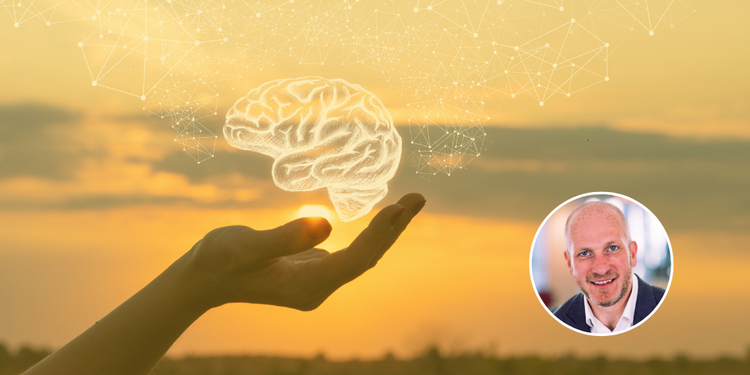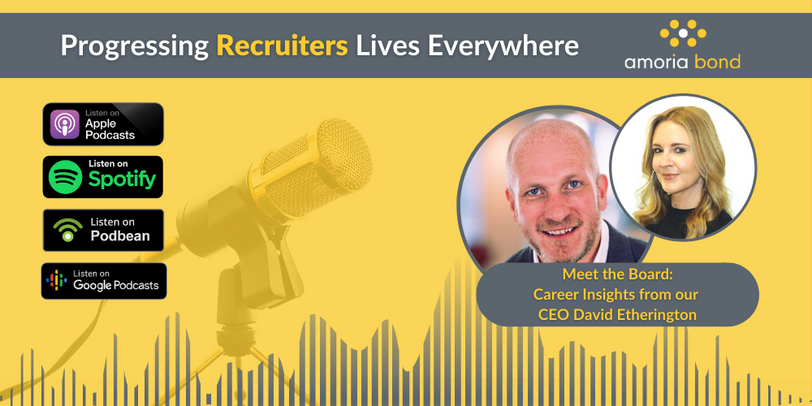
On average, it’s estimated that a third of our working day is spent distracted and off task, with 58% of employees reporting an inability to regulate their attention at work. This not only impacts productivity but raises stress levels. We live in a technologically advanced world where the pressures of work and information overload are contributing to the so-called 'distraction epidemic', making us feel like we're busier than ever before.
In a recent episode of The Progressing Lives Everywhere Podcast, Andrew Beard, Associate Director of Amoria Bond's Engineering Division Europe, spoke with Ineke Leemans and Petra Keuchenius from the Potential Project. They discussed how mindfulness meditation could help us overcome the distraction epidemic and progress our lives.
The Potential Project's work has supported over 350,000 individuals in adopting new ways of working and leading over the last decade, helping leaders and teams understand and manage their minds. Follow these tips to improve your focus and progress your life further in 2022.

Combat multitasking - 'the mother of all evil'
"Our mind is wired for distraction", Petra says. Unfortunately, many of us unknowingly distract ourselves by multitasking. We give up our attention by trying to complete multiple different tasks throughout the day, rather than focussing on the long-term goals of our self and company progression.
Petra said: "research shows us that almost half the time our mind is wandering, and we are not paying attention to the things we choose ourselves. We are constantly distracted.
(...) We are constantly multitasking the whole day through. And this means we try to put our attention on two things at one time. And research shows us that's not possible at all."
For example, if you take on two tasks simultaneously, at best, you'll be giving 50% attention to each, when the best results often depend on total focus.
Founder and CEO of the Potential Project, Rasmus Hougaard, has been on record to say multitasking is 'the mother of all evil' when it comes to performance, well-being and building connections with others.
As Petra mentions, our prioritisation and creativity decrease when we try to tackle multiple tasks at once. Petra says: "(When) we are switching constantly between two tasks, that drops our prioritisation, our creativity, and it increases our stress."
By multitasking, you create a cocktail of distractions that will lead to lower productivity and be detrimental to your well-being and mental health.
Petra expands on this by saying "Try to create more awareness of the distractions and once you're aware of the distraction, try to make a conscious choice (of) where to put your attention. And pick one thing at a time. In this way, you will train your attention muscle.
(...) You are rewiring your brain; that's what you are doing."
Multitasking is like a juggling act where you try to keep multiple plates spinning at once. As you try to spin multiple plates, you become more frantic, more stressed, and eventually get distracted to the point where one if not all your plates will fall and break.
Therefore, it's important to make a conscious choice to use mindfulness meditation to hone in on a single task at a time. Plan each day ahead of time, give yourself time for unexpected things that may occur in your day, and avoid the 'mother of all evils' of multitasking.
Manage action-addiction
Action addiction is another key contributor to the distraction epidemic. Here you have an uncontrollable urge to do something, and you feel discomfort doing nothing, as Ineka would explain.
"You have an uncontrollable urge to do something. You grab your phone, check the news, (and) immediately give a response to an email, so everything there is you want to react. (...) And the other thing is you feel discomfort with being still, doing nothing."
Petra summarises action addiction by saying: "you're like a busy bee. So the whole day you are doing something, and you react on your autopilot to all the distractions, so your mind is going all over the place."
We're always looking for a quick fix of dopamine to keep us going in today's society. We do this by completing small tasks and making ourselves believe we've achieved something when all we're doing is avoiding the bigger picture and limiting our chances of progression.
Ineka adds: "I think at that moment that you are action addicted; you're also addicted to dopamine. Because every time you get a kind of a dopamine shot and you need more and more like you see with other addictions. And I'm not sure that we, as humans, are aware of this."
Seeking a short-term dopamine kick is not helpful when it comes to progression, as Petra added.
"(when it comes to dopamine) you want more and more. So, you are busy the whole time and you are going further and further with all the distractions. And so you are off your long-term tasks and you're only (looking for) the short term dopamine kick, and that's not helpful for the progression of your organisation and for the business results."
An organisation Petra is helping to coach are going through a high pressured international takeover. People within the company are demonstrating the symptoms of action addiction by working until late at night through to the early hours of the morning - leaving no time for self-care, ultimately leading to exhaustion and burnout.
Petra said: "during the coaching yesterday, (a member of the board) realised this herself, that there is no time to zoom out with each other and to see the bigger picture and seeing where they can influence and where they can put their focus. And she decided to take more self-care and to be more aware of action addiction."
Action addiction is essentially shallow work, and the example Petra provided shows how a lack of self-care will affect your ability to work to your full potential. As Petra would emphasise, mindful practices as a form of self-care is crucial to managing action addiction.
"I want to emphasise that self-care for leaders is crucial because otherwise, it's not possible to zoom in and be flexible the whole time and to use your full potential."
The pandemic affecting the epidemic
Practising mindfulness exercises has never been more valuable. COVID has made many of us uncertain about our futures, creating a lot of obsessive thinking, helplessness, fear and anxiety - all distractions that hinder progression.
Many organisations have utilised the Potential Projects mindfulness programme to support their employees throughout the pandemic.
The Potential Project runs online sessions where leaders and employees come together to share and address their emotions in a safe space.
Practising group mind training is an excellent way for employees to connect, discuss any fears, and build mental resilience. Also, it allows the employees to take a step back from the autopilot ways of working and focus on the bigger picture and broader company objectives, as Petra would mention.
"Fear can narrow our field of vision, making it harder to see the bigger picture and the possibilities in front of us. And the way to overcome this natural tendency is to build mental resilience. So you can create a mental space between what's happening and how you are reacting, instead of the automatic autopilot."
Ineka mentioned how many companies use group mind training in the workplace to build a community. Also, employees find it easier to practise the mind training in a group environment - essentially motivated by joint accountability.
Ineka said: "We see that a lot of companies now offer a kind of drop-in sessions where people can come together just for 15 minutes or half an hour to practise the mind training together. And it has also the effect of building a community. And I know from experience it's much easier to exercise together like you do when you go to the gym."
Reserving time for mindfulness training in the workplace is something well-worth considering as an employer or leader, particularly as the effects and regulation of the Covid pandemic continue to change and impact our lives.
Ensuring the mental well-being of your employees or team is sustained in a way that allows them and the organisation to progress is crucial, as Petra suggests: "I think for organisations, the brain of their people is the greatest asset there is."
Train your brain through mindfulness
Mindfulness meditation training is essentially cardio work for the brain - and the more you work at it the more positive habits you will develop to help fight the distraction epidemic. Mindfulness apps - such as the one offered by The Potential Project - are a great place to start your training process.
Petra says it's important when using mindfulness is to "set an intention (of) what you want to develop and to know why you are doing this. And make it as concrete as possible.
So make an appointment with yourself. What time? What place? Because that makes it easier for you to make it a new habit. (...)
If it's possible, do it at the beginning of the day, and you will feel it, you will feel it the whole day, and it will give you a more clear focussed mind."
Key benefits of mindfulness meditation training:
- You feel fully present
- Reduce stress
- Feel more aware of where to put your focus
- Better sleep
- Increases your energy, creativity and productivity
- Improves mental health
- More relaxed - meaning you can enjoy life
By bringing mindfulness training into your daily routine, you will fight the distraction epidemic, giving you a better chance of progressing your life.
__________________________________________________________________
How are you fighting off distractions to improve your focus, reach your goals and progress your life this year? Learn more about why fighting the distraction epidemic is so important by listening to the full conversations with Ineka, Petra and Andrew by searching “Progressing Lives Everywhere” on your preferred podcast platform, or by watching the full, unedited interview via the link below.
Progressing Lives by Fighting the Distraction Epidemic with Petra Keuchenius and Ineke Leemans
If you're looking to progress your business or want to unlock your potential, contact us today and discover how Amoria Bond recruitment services can help.





